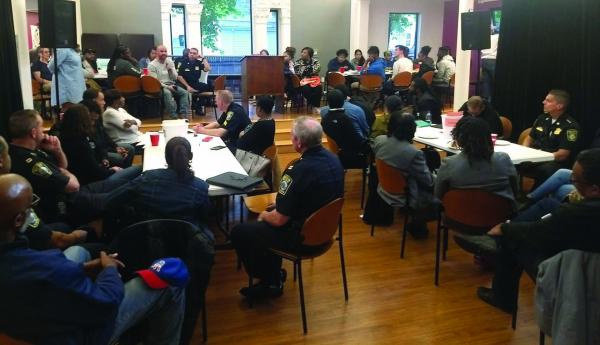May 23, 2019

Some 50 people gathered in the Mattapan Teen Center on Hazelton Street last Friday as Boston City Council President Andrea Campbell convened the third meeting of a series she is holding on “Constructing Peaceful Communities.” Photo by Caleb Nelson
Fifty-seven-year old Brenda Lee Keller died last Thursday at a bend where Fottler and Hiawatha roads meet in Mattapan. Neighbors say she tripped before she was hit by a passing car, but Boston Police say it was not an accident but a vehicular homicide, and they are seeking information about a black sedan that was spotted near the scene.
In the face of news about such a tragedy, residents who live in the suburban-like alcove bordered by Walk Hill and Almont streets and Blue Hill Avenue that is is made up of three-deckers and a number of single-family homes were willing to talk about life in their neighborhood today and going forward.
That evening, a woman named Marilyn, who has lived around the corner from where Ms. Keller died since 1973, told the Reporter that “people come up streets going crazy no matter where you are. I feel very safe in this neighborhood.”
Nearby, Ashley Palatios sat on the front steps of her home attaching beads to her leather boots for a Caribbean Festival. “People in the community have to want to work together in order to have a successful community,” she said. “It starts within.”
And Jamael Marcel was cleaning an SUV outside his house. He had recently moved into the neighborhood, and he readily suggested that the city could host free barbecues where people can meet each other and make new friends and talk casually.
“Say for example they were to use this whole street, and get a bunch of artists to show their paintings on each side,” he said. “Just provide something to do while you’re learning different things with the community.”
On Friday, Boston City Council President Andrea Campbell, who represents District 4, convened the third meeting of a series she is holding on “Constructing Peaceful Communities.” About 50 people gathered for the session and a meal in the Mattapan Teen Center.
“If you solve the issues here, you solve the issues of the entire city of Boston,” Campbell said. “If you solve the issues that plague District 4, where the inequities show up, where you can see them, where you can feel inequities in a number of incidents of violence, poverty, housing inequities, wealth, income, and development. This is really where you see the inequities. Many of these communities have been under-resourced and underserved for a long time.”
In a community where violence is not uncommon, where gunfire killed a 74-year old grandmother and injured two other people just a month earlier around the corner from the deadly auto incident, citizens discussed how healing can happen.
Resolving conflict within the community requires building trust, observed BPD Captain Jim Fitzpatrick, but it also requires helping people find fulfilling work and connections.
“You’re always a work in progress trying to keep trust within the community,” he said. “We’d like to interact with young men within the community to help reduce recidivism by offering them meaningful jobs, once they’ve served the time that they may have been sentenced to, that they’d get a meaningful job that would allow them to have a sustainable life, health benefits, help them take care of families, if they have families.”
Mental stability is key to reentry into society after incarceration, pointed out Christian White. The transition back home from jail can be slow and rough. He added that providing mental health treatment to those who have been through trauma, or otherwise need help finding stability and purpose after incarceration, is very difficult.
“There is still a lot of work that needs to be done with just mentioning mental health,” said White. “So many people spoke of programs, how we could be doing this. The church could be doing that, but nobody is talking specifically about empowering the young people and the older people, and that begins with mental health.”
Said Cory Easter, who found out about the meeting through a friend who is a community activist: “Intervening before tragedies strike requires meeting people where they are at. We might combat idleness with meaningful work opportunities.
“It’s all about getting in touch with these officers that are out here, and getting to know them and them getting to know us as well as getting to know your neighbors, people who are around you because a lot of people don’t know who’s around them,” he said. “Everybody has questions and concerns and allegations and should speak up.”
As Memorial Day approaches, the good weather brings new opportunities for violence, and also for community engagement. A woman named Jacqueline, an elder in the community, said that she would like to see more police presence in her community. “You prefer to stay inside because then you are just a little bit safer,” she said. “All the nice days bring is sorrow most of the times.”



